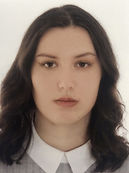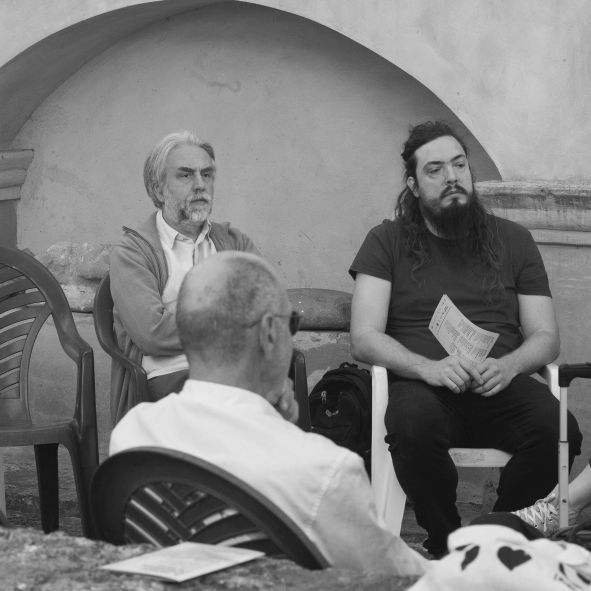
Laura Vrabec, Institute for Cosmoloy and Philosophy of Nature and 3rd year pregraduate student of philosophy is interested in fundamental questions of being and their relationship with psychology and antropology, in philosophy of nature, and especially interested in the possible role of symbolism and mythological imagination in understanding the reality.
"In this respect I find the problem of time very important - most significantly from the perspective of inevitability of individual death, and relationship between cosmological and psychological perception of time."

Dragan Novković graduated from the Faculty of Electrical Engineering at Belgrade University. After completing postgraduate studies in the field of acoustics, he received his doctorate at the Faculty of Technical Sciences in Novi Sad. He is employed as a professor at the School of Electrical Engineering and Computer Science in Belgrade. He is active as an initiator and leader of international projects in the fields of science, art and higher education. He was the initiator of the prestigious Quantum Music project which was realized in cooperation with the University of Oxford, which he led in the period from 2015 to 2022. Last ten years Dragan intensively deals with issues and problems of fundamental science. He is known to the wider audience for his research work in the field of history and philosophy of science, as well as issues of children upbringing and schooling. He is considered as one of the best Serbian connoisseurs of Nikola Tesla's life and work. Some of his lectures and interviews on such topics are easy to find on Internet/Youtube.
Abstract:
Primary flux as the basis of reality. The fundamental physics of our civilization is completely based on Cartesian ontology, philosophical foundation that was formed during the 17th century, which is exclusively materialistic and quantitative. On the other side, consistent historical development of ontological thought, from the Indian Vedas, through ancient philosophy, has its foundation in the so-called Tripartite ontology, which stands in complete opposition to the Cartesian one, and which was totally expelled from contemporary science at the beginning of the 20th century with the introduction of relativity and quantum mechanics. Science that is based on Tripartite ontology treats the flux of primary energy as the fundamental physical quantity, from which all other basic elements of creation (time and space), as well as all other physical quantities and phenomena, are derived. The goal of this presentation is to familiarize the attendees with the setting of this kind of fundamental science, as well as potential ways of thinking about the origin of the reality to which we are all exposed.

Kristina Bojanović, Humanistic Studies, University of Donja Gorica, Podgorica
Time has always occupied philosophical attention, as a factor that governs human life and being, governs nature and the world, governs the concept and thought of the world. The world exists in time. Human being is born within the framework of time, develops and disappears within it. However, time remains incomprehensible and elusive, even though everyone considers it known and obvious. Time reveals the truth of human life, which unfolds alongside decay and death. Without its understanding and acceptance, we remain strangers to the truth of life and our existence. In the context of the philosophical reflection on time, I am particularly interested in the contributions and claims of Emmanuel Levinas, especially those related to the notion of the future and infinity. The relation to the future is realized in the relation to the Other, i.e: the face-to-face encounter with the Other is the realization of time. The condition of time resides in the relationship between human beings. And that relationship makes sense only if it is ethical. The right use of time in the present life brings eternal gain; in other words, through the intersubjective relation, through the relation with the Other, through caring for the Other, through living with the face of the Other and absorbing the trace of that face, we are on the trail of infinity. "Obtaining" infinity in this earthly time and enjoying infinity in the time after bodily existence is inseparable from ethics.

Ana Beguš, University of Primorska
"If a dragon flew overhead right now I'd be surprised but not surprised surprised": phenomenological derealization and loss of the world due to technological high-speed acceleration of time."
I am interested in time as an intermediate category between external (physical) time and internal (metaphysical) time. This type of time is socially conditioned and structured by technology. It is best defined by Virilio's concept of acceleration. Virilio claims that the constant technological acceleration of reality leads to a loss of phenomenological space-time and to derealisation, a feeling that reality as-we-know-it has disappeared. Compared to nostalgia, which could also be seen as a kind of derealisation, this new condition is much more acute. In nostalgia, the connection to the past that existentially shapes us is still present (albeit through a sense of absence or longing for the past), but in high-speed acceleration we lose our existential sense of the world as a whole. In other words, nostalgia is too slow for the new speeds of acceleration and becomes irrelevant as a concept, along with many other concepts that used to define us. Politically speaking, derealisation results in a new level of mental and moral anaesthesia which not only makes us easy prey to propaganda but also malleable enough to accept fantastical claims and descriptions of the world as realistically possible or unsurprising, as exemplified by the above statement taken from an internet meme (as a humorous expression of popular sentiment). I try to further analyse the symptoms and implications of this recent existential condition.

Natalija Medojević, Faculty of Philosophy, Department of Philosophy, Banja Luka
Time and flow in science, philosophy and culture
We are in a time where technological development has reached its peak. It's hard to imagine what could be next, given the technology we have today. Artificial intelligence is making incredible progress today, but has it actually done us a "disservice" and to what extent does it violate ethical rules? Have we reduced ourselves from man living in nature to seeing nature in a picture made by artificial intelligence. To what extent is science today woven into all spheres of our lives, and can it destroy our culture and art? Is it all about universality that leads to the monotony of the world? Therefore, in the abundance in which we live today, in the easier life and rights that generations fought for and worked hard to achieve, do we lose our meaning? What is certain is that science cannot influence living art, thinking and philosophy as we have it today, because it requires man, as he is.

Anabela Zrnić, Faculty of Philosophy, Department of Philosophy, Banja Luka
Time and transience I associate with nostalgia. By reading Victor Frankl I came across an
interesting concept that has troubled me for a long time, which is the purpose and essence of
human existence. I would like to analyze how did the flow of time impacts and shapes our
thoughts on the meaning and essence of human existence. "Time and passage" invites philosophical discussion on the nature of time, its subjectivity and objectivity, as well as issues like free will and determinism. Throughout the centuries, art has been a keyway to explore this subjective experience of time. Artists have often dealt with themes such as transience, the search for meaning, and existential crisis. Through their works, they have attempted to capture moments of existence and explore the depth of human experience. At the same time, science has played an important role in our understanding of time, but also in our understanding of ourselves as existing in time. Scientific progress allows us to understand the nature of time, but also reveals that time is not just a physical dimension, but a complex experience that shapes our consciousness, our relationships, and our existence. Culture, as a result of collective human experience, also reflects our understanding of time and our relationship to it. Through myths, religion, art, and philosophy, people have tried to answer questions about the meaning of time.
and our place in it.

Nemanja Tubonjić, Faculty of Philosophy in Banja Luka
DIALECTICAL NATURE OF TIME
Philosophical thinkers argue that flux is inherent in the ever-shifting configurations of matter,
challenging traditional notions of linear time and permanence. Through critical analysis of
different philosophies, this gathering should explore how conceptions of time and flux shape our understanding of reality, consciousness, and the human condition. By elucidating the intricate relationship between materialism, temporality, and change, I hope to contribute to broader discussions in philosophy concerning ontology, causality, and the nature of existence in time.

Lucija Lena, Philodophy, University Zadar
Time and Flux
Philosophy of time and flux was first introduced to me at my freshman year of college. The introduction of Croatian philosophers such as Franjo Petrić and Ruđer Bošković fascinated me as well as their philosophies, specifically Petrić’s distinction between mathematical and physical space which would later have major impacts on the development of modern thought in Galileo, Kepler, Newton, and Descartes. These debates of what space is shaped our modern understanding of science which resulted in today’s Einsteinian understanding of space-time being linked. So, now, the question remains whether we’re going to stay in this Newtonian bubble or can we introduce some of these old concepts of time, space, and change, into the modern age to go even a step further.

Martin Karaban
Time and Flux
The conception of time has been interesting for various reasons ever since the clash of Heraclitus and Parmenides. Parmenides, and Zeno as his student, brought up interesting paradoxes which lead them to the conclusions of time being an illusion. It took centuries for some of their paradoxes to be solved with the Newtonian advancement of mathematics. For now, we can only wonder if the problems which McTaggart posed at the beginning of the 20th century will be solved in a similar manner to Zeno's or if they are here to stay.


































































